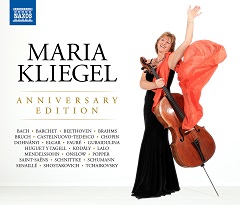Im Booklet dieser zum 70. Geburtstag von Maria Kliegel herausgegebenen Box, deren Text zu schreiben ich die Ehre hatte, steht: « Es gibt Menschen, die kann man sich nur so vorstellen, wie sie sind. Maria Kliegel ist so eine Person. Sie hat ihr Leben dem Cello gegeben, und das Cello hat ihr alles gegeben, was sie in ihrem musikalischen Leben braucht, als Cellistin wie auch als Pädagogin. Man nennt sie nicht umsonst ‘La Cellissima’. Dass man sie so wahrnimmt, sie als eine ‘Klangbildhauerin’ oder die ‘Küchenchefin des Klanges’ bezeichnete, dazu haben ihre Schallplattenaufnahmen wesentlich beigetragen, und darunter insbesondere jene von Naxos, wo der bei weitem größte Teil ihrer Einspielungen erschienen ist. Es gibt kein ‘Best of’, kaum eine wichtige Kollektion des Labels, wo ihr Name nicht auftaucht. »
Entsprechend weitgestreckt ist das Programm der Geburtstagsedition. Die Musik, die auf den drei CDs erklingt, ist das Resultat einer eigenen Auswahl von Maria Kliegel. Es ist eine Mischung aus verschiedenen Besetzungen, längeren und kürzeren, schnellen und langsamen Sätzen, mit bekanntem und weniger bekanntem Cellorepertoire aus diversen Epochen mit verschiedenen Stilistiken und Genres.
Maria Kliegels dunkel gefärbtes, aber immer warmes, sensibles und kantables Cellospiel mag ich sehr: die Cellistin kann den Zuhörer so richtig in ihren Bann ziehen, von innen heraus, ohne Gefühlsbefrachtung, mit weitausgreifendem musikalischen Duktus. Ihr Spiel ist immer intensiv und aussagekräftig.
Die drei CDs enthalten zwangläufig meistens nur Auszüge aus den Aufnahmen, und sie werden sicher dem Hörer Lust machen, das eine oder andere Werk ganz zu hören.
Meine persönlichen Tipps sind die Bach-Suiten, sehr narrativ und hoch expressiv, Beethovens Klaviertrios, mit viel Elan, aber auch seelenvoll sensibler Hingabe, die Saint-Saëns-Sonaten mit François-Joël Thiollier am Klavier, spritzig, tänzerisch, leidenschaftlich, die hoch dramatisch interpretierten Cellosonaten von Kodaly mit dem Pianisten Jenö Jando, die glühende Interpretation von John Taveners 45 Minuten dauernden Marien-Hymne The Protecting Veil mit dem Ulster Orchestra unter Takuo Yuasa, Schnittkes Cello-Konzert mit dem Radio-Sinfonieorchester Saarbrücken unter Gerhard Markson, bis heute eine der besten Aufnahmen dieses Werks, und schließlich die Gubaidulina-CD mit Elsbeth Moser am Bajan.
In the booklet of this box, published on the occasion of Maria Kliegel’s 70th birthday, the text of which I had the honor of writing, it says: « There are people you can only imagine being the way they are. Maria Kliegel is one of them. She’s given her life to the cello, and musically speaking, the cello has given her everything she needs in life, both as a cellist and as a teacher. She’s not called ‘La Cellissima’ for nothing! That she’s seen as such and has been described by people as a ‘sculptress in sound’ or the ‘master chef of sound’ is substantially the result of her recordings on disc, especially those for Naxos who have released the great majority of her recordings. There are no ‘Best Of’s and hardly any important collections on the label on which her name doesn’t crop up. »
The birthday edition’s program is correspondingly wide-ranging. The music heard on the three CDs is the result of Maria Kliegel’s own selection. It is a mixture of different instrumentations, longer and shorter, fast and slow movements, with well-known and less well-known cello repertoire from diverse epochs with different styles and genres.
I like Maria Kliegel’s darkly colored, but always warm, sensitive and cantabile cello playing very much: the cellist can really captivate the listener, from the inside out, without emotional freighting, with far-reaching musical ductus. Her playing is always intense and expressive.
The three CDs inevitably contain mostly only excerpts from the recordings, and they will certainly make the listener want to hear one or the other work in its entirety.
My personal tips are the Bach suites, very narrative and highly expressive, Beethoven’s piano trios, with much verve, but also soulfully sensitive devotion, the Saint-Saëns sonatas with François-Joël Thiollier at the piano, sparkling, dancing, passionate, the highly dramatically interpreted cello sonatas by Kodaly with pianist Jenö Jando, the glowing interpretation of John Tavener’s 45-minute Marian hymn The Protecting Veil with the Ulster Orchestra under Takuo Yuasa, Schnittke’s Cello Concerto, with the Saarbrücken Radio Symphony Orchestra under Gerhard Markson, to this day one of the best recordings of this work, and finally the Gubaidulina CD with Elsbeth Moser on bayan.
Ludwig van Beethoven: Tripelkonzert op. 56 (1. Satz)
Edouard Lalo: Cellosonate (3. Satz)
Zoltan Kodaly: Cellosonate op. 4 (1. Satz) + Duo für Violine & Cello op. 7 (1. Satz)
Johannes Brahms: Konzert op. 102 für Violine, Cello, Orchester (1. Satz) + Cellosonate op. 78 (1. Satz)
Johann Sebastian Bach: Cellosuite BWV 1011 (Prelude & Sarabande)
Sofia Gubaidulina: Mein Gott, mein Gott, warum hast du mich verlassen aus Sieben Worte
Frédéric Chopin / Alexander Glasunow: Etüde Nr. 6
Frédéric Chopin / Gregor Piatigorsky: Nocturne cis-Moll
Ernst von Dohnanyi: Ruralia hungarica op. 32d
Siegfried Barchet: Boulevard de Garavan
Jean Baptiste Senaille: Violinsonate Nr. 4 (4. Satz)
David Popper: Fantasy on little Russian Songs op. 43 + Im Walde-Suite op. 50
Camille Saint-Saëns: Cellokonzert Nr. 2 (2. Satz) + Suite für Cello & Klavier op. 16 (2. & 3. Satz)
Mario Castelnuovo-Tedesco: Figaro-Variationen nach Rossini
Huguet y Tagell: Flamenco aus Suite espagnole
Piotr Tchaikovsky: Valse sentimentale op. 51 Nr. 6
Felix Mendelssohn: Cellosonate Nr. 1 (2. Satz)
Dmitri Shostakovich: Cellokonzert Nr. 2 (3. Satz)
Max Bruch: Kol Nidrei op. 47
Camillo Schumann: Cellosonate Nr. 1 (3. Satz)
Alfred Schnittke: Cellokonzert (1. Satz)
Gabriel Faure: Papillon op. 77; Romance op. 69
Georges Onslow: Cellosonate op. 16 Nr. 1 (3. Satz)
Robert Schumann: Stück im Volkston op. 102 Nr. 2
Edward Elgar: Cellokonzert op. 85 (4. Satz)



















